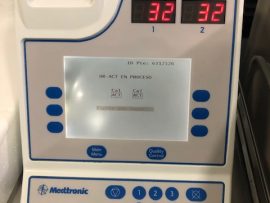Abstract Introduction Antithrombin (AT) is a natural anticoagulant essential to enhancing the unfractionated heparin (UFH) anticoagulant effect. Its supplementation in the management of UFH-based anticoagulation during veno-venous extracorporeal membrane oxygenation..
Read MoreAbstract Blood surface interfacing that occurs within the extracorporeal membrane oxygenation (ECMO) circuit initiates contact activation, an important hemostatic pathway initiated by the Hageman factor, also called factor XII. Factor..
Read MoreAbstract Objective To evaluate the impact of inflammation on monitoring for patients supported with (ECMO). Design Prospective single-center . Setting University-affiliated tertiary care academic medical center. Participants Adult venovenous and venoarterial ECMO patients..
Read MoreAbstract Background: Patients maintained on extracorporeal membrane oxygenation (ECMO) often require systemic anticoagulation to prevent circuit clotting and systemic thromboembolic complications. The optimal intensity of anticoagulation to balance the risk..
Read MoreAbstract OBJECTIVES: To derive systematic-review informed, modified Delphi consensus regarding the medications used for anticoagulation for pediatric extracorporeal membrane oxygenation (ECMO) for the Pediatric ECMO Anticoagulation CollaborativE (PEACE). DATA SOURCES: ..
Read MoreAbstract OBJECTIVES: To identify and prioritize research questions for anticoagulation and hemostasis management of neonates and children supported with extracorporeal membrane oxygenation (ECMO) from the Pediatric ECMO Anticoagulation CollaborativE (PEACE)..
Read MoreAbstract OBJECTIVES: Continuous, therapeutic anticoagulation is the standard of care for patients on extracorporeal membrane oxygenation (ECMO). The risks of hemorrhage exacerbated by anticoagulation must be weighed with the thrombotic..
Read MoreAbstract The safe use of cardiopulmonary bypass (CPB) relies upon the ability to administer, monitor, and reverse anticoagulation. Although rare, the factor XII deficient patient creates a challenge for the..
Read MoreAbstract Objective Extracorporeal membrane oxygenation (ECMO) requires systemic anticoagulation to reduce the risk of thromboembolic events. Despite its historic role, activated clotting time (ACT) remains a widely used heparin monitoring..
Read MoreAbstract Anticoagulation is an essential component of optimal extracorporeal membrane oxygenation (ECMO) management. Unfractionated heparin is still the anticoagulant of choice in most centers due to longstanding familiarity with the..
Read MoreAbstract Extracorporeal membrane oxygenation in a venovenous configuration (VV-ECMO) is increasingly recognized as an important therapeutic option for patients with severe acute respiratory distress syndrome (ARDS). Accumulating scientific evidence as well..
Read MoreAbstract Background Patients with severe acute respiratory distress syndrome (ARDS) show a high mortality rate of up to 60 %. In such cases, extracorporeal membrane oxygenation (ECMO) support is often required,..
Read MoreCardiopulmonary bypass (CPB) is a cornerstone of modern cardiac surgery, enabling complex procedures by temporarily taking over the heart and lung functions. However, one of the most critical aspects of..
Read MoreAbstract Introduction During extracorporeal membrane oxygenation (ECMO) systemic anticoagulation with unfractionated heparin (UFH) is standard-of-care. However, there is uncertainty regarding optimal anticoagulation monitoring strategies. Methods We retrospectively investigated venovenous and..
Read MoreAbstract The 2021 Adult and Pediatric Anticoagulation Guidelines for patients on extracorporeal membrane oxygenation (ECMO) recommend a target partial thromboplastin time (PTT) between 60 and 85 seconds when unfractionated heparin..
Read MoreAbstract Background Bleeding is a common and sometimes fatal complication of venovenous extracorporeal membrane oxygenation (ECMO). Whether lowering the intensity of anticoagulation during venovenous ECMO is safe or effective is..
Read MoreAbstract Background Anticoagulation in pediatric extracorporeal membrane oxygenation (ECMO) presents unique challenges due to developmental hemostasis, coagulation factor production, and response to anticoagulants. This process requires close monitoring to prevent..
Read MoreAbstract Background Extracorporeal membrane oxygenation (ECMO) is increasingly used in patients after cardiac surgery; however, anticoagulation management has consistently been challenging. This study aimed to explore the feasibility of a..
Read MoreAbstract Objective To review and compare the frequency of thrombus and adverse events in patients treated with heparin or bivalirudin systemic anticoagulation strategies supported on combined venoarterial extracorporeal membrane oxygenation..
Read MoreAbstract Solutions to reduce the need for systemic anticoagulation during extracorporeal life support would improve safety and utility. The study objective was to evaluate the safety and efficacy of a..
Read MoreAbstract The advancement of has introduced a new dimension to managing patients who do not respond to conventional treatment of severe . (ECMO) is a specialized temporary life support that serves as a..
Read MoreAbstract Background: Compared to heparin, there is limited evidence of the benefits of bivalirudin in the patients with extracorporeal membrane oxygenation (ECMO). Methods: We searched for studies comparing bivalirudin anticoagulation..
Read More













